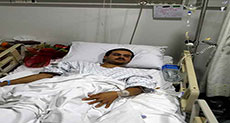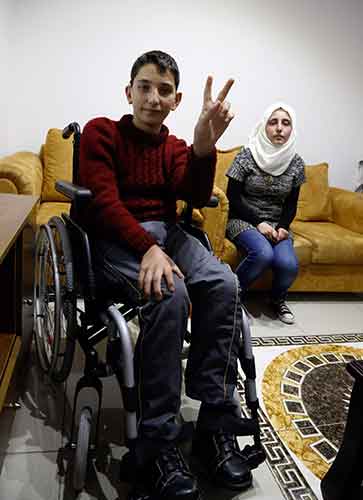
The Wounded of Foua: Treatment in Lebanon before Returning to Syria

Latifa al-Hosseini
For over 9 months they lived in horror and panic. A recurrent terrorism which threatened them throughout the day. They waited long to finish from their "panic". The armed groups with their various factions did not rest for one day during the 270 days, torturing and killing them. A tragic reality which the people of the towns of Kefraya and Foua reject to become accustomed to and accept, as the tough negotiations which the Syrian government waged with the militants were able to constitute a means by which to save 122 wounded people. These 122 were injured by mortar shells, which continue to fall upon the heads of the besieged people in the two towns located in Idlib, where the brutality of "Daesh" and the "Nusra Front" and "Ahrar al-Sham" outweighs any level of crimes of genocide and systematic murder.

While looking into the views of those besieged in Foua, of whom some reached Lebanon as part of a deal to release the wounded and those with special needs from the two towns, the scale of the humanitarian catastrophe that has befallen them becomes clear. Hajj Ahmad Faour tells "al-Ahed": "We use to live in safety until the so-called "revolution" broke out, which reflected on us with daily attacks which do not distinguish between young and old, and it created between the spectra of our society sectarian boundaries that we have not been use to ever since we were born, especially since relations of brotherhood and affinity brings us and the people of the surrounding villages together, even if they were of different sects".
Hajj Ahmad speaks with agony about the food-related suffering which his relatives and neighbours were exposed to. Hajj Ahmad lost two sons as a result of the terrorist bombardment of his town, and he also lost his wife due to the scarcity of medicine and the difficulty in obtaining them, (saying this while) embracing a son that was wounded in his eyes. The low Syrian currency has significantly influenced the purchasing power of families in Foua and Kefraya. According to Hajj Sitini, it is no longer possible to supply the home with basic materials, especially since he is not able to take out his retirement salary from his official job.
All the modest and necessary requirements of life are now to be dreamt of, as the aircrafts which use to bring bread, wheat, lentils, and the like, have now become exposed to terrorist missile fire. Even the urgent medicines for critical cases and the injured are no longer available, and delivering them is very complicated. "The siege has been enforced on us also in relation to drinking water and services, which have been cut off from us by the Takfiri practices on the one hand, and the monopoly of traders during the crisis on the other, as for the issue of high prices, this is another issue...all our needs have increased in price like crazy."
According to Hajj Ahmad, the danger of becoming martyred at any moment surpasses all other threats, "as the lack of food does not scare us as much as the daily, haphazard bombardment which we were subjected to, our only crime being that we are Shiites, and they accuse us of loyalty to Iran and Hezbollah". Despite all this suffering, the man in his sixties expresses his determination to return to Syria no matter the sacrifices and hardships, as there is no alternative to the homeland,
Hassan, the son of Hajj Ahmad, speaks with difficulty about becoming wounded by missile shells. Hassan narrates to "al-Ahed" that "due to a surprise attack by the militants on our town, we hurried with the townspeople to defend it and repel the aggression, in September to be precise, and while we tried to recapture control of a particular border point, I was struck with a B7 shell, from which my brother immediately died, and I am in Beirut today to undergo an operation on my face". Hassan speaks of his readiness to return to his homeland, and that no matter how long the medical treatment takes, it will not dissuade him from Syria.
Ridha Muhammad Dib al-Masri, a son of Foua aswell, left his mother and finance' in the besieged town after the deal included him, so that his wound could be treated after his hand and leg were injured by shrapnel from a 23 mm shell during clashes with the terrorists while they attacked the town. The wounds were not limited to external injuries, as the shrapnel broke a part of his skull. Ridha is looking to get an appointment for the planned operation, so that he can step foot on the soil of Foua and embrace his family, even if the danger and siege remains.
Mass injuries with the signature of the terrorists, who do not see in the people of Foua and Kefraya anything but targets that must be taken out. Crimes that led the wounded to Lebanon for their treatment, so that they can rise up once again and return to their country. The scale of brutality which the terrorists carry out translated also into difficult psychological states which are experienced today by a number of these people. Nervous breakdowns, excessive fatigue, and psychological disorders struck the mothers who lost their sons before their eyes, and nurses who treated their near-ones in very difficult circumstances.
Amongst the wounded, the name of Hassan Dadash stands out. He joined the defence committee of the town. Hassan tells "al-Ahed": "After we managed to repel the first attack of a tank belonging to the militants, and during our attempt to strike another tank, an "RPG" rocket blew up on my shoulder, so I was struck on my jaw and hand, and I entered a coma in the hospital, and now I am waiting for an appointment for my operation to treat my wounds", and he adds "my comrades in the defence committee continue today to be stationed along the borders of the town, defending our people and preventing any militant from entering, despite the cold weather and the scarcity of weapons", while adding "I eagerly wait for the operation to end so I am able to return to where I was born".
With great sadness, the nurse Hanan Saleh expresses her grief at her separation from her family in Foua, yet she has faith that the reunion in her town will occur once again. She speaks of the great difficulty she faced after she joined the medical group in Foua when it was under siege, and her inability to return back to her university in Latakia, where she was undergoing medical studies. The lack of emergency personnel impeded attempts by Hanan to rescue those wounded from the terrorist attacks. She says "we did everything we can to treat the wounded, yet the lack of medical supplies, and the inability to receive the wounded in the full operation rooms would prevent us from rescuing innocent people, some of which would become martyred due to this problem".
Abdullah Dadash is a father of a martyr and a wounded son in Foua. He recalls how the townspeople suffered throughout the siege, saying "the siege worsened recently, and we needed bread, fuel, and methods to keep warm, (yet) there was no more money to buy our daily needs, and despite everything that happened to us, we remain perseverant and we will remain as such...I left my wife and daughter over there without any supplies, both will persevere God willing", and he continues "the Takfiris did not care about whether it was night or day when carrying out their attacks on us, nor did they commit to any ceasefire which they announce". Abdullah is convinced that the terrorism that looms over his town and its people will vanish, and the return to the town will come soon, after Foua is liberated from the filth of the Takfiris.
As for the child Mahdi Taqi, who was struck by a shell that took away his ability to walk and some of his hearing, and his speech was affected, he narrates to "al-Ahed" his difficult tale, saying: "I was returning back from school, and I was struck by a shell which fell on the area where I was, which harmed my spinal cord, making me unable to walk on my feet anymore". Mahdi today is unable to go to school, and for this reason, one of the teachers was assigned with teaching Mahdi at home. Mahdi wants nothing other than to recover, so that he can play with the ball as he use to. Mahdi believes this dream will come true soon.
The wounded of Foua today await for their treatment to be completed successfully in Lebanon. Some of the wounded of Foua are still besieged by the terrorists today, while others managed to leave to Damascus and move onto Lebanon under the Zabadani agreement. The siege of both towns caused a rapid decline in the population of the towns, from 25 thousand to 15 thousand. All these people look forward to the rescue of their town from the brutality which threatens young and old. A dream which they hope will come true soon, through the efforts of those who remained committed to defending the oppressed and innocent people, and those who refuse to submit to the language of terrorism and fear.
Source: al-Ahed news



